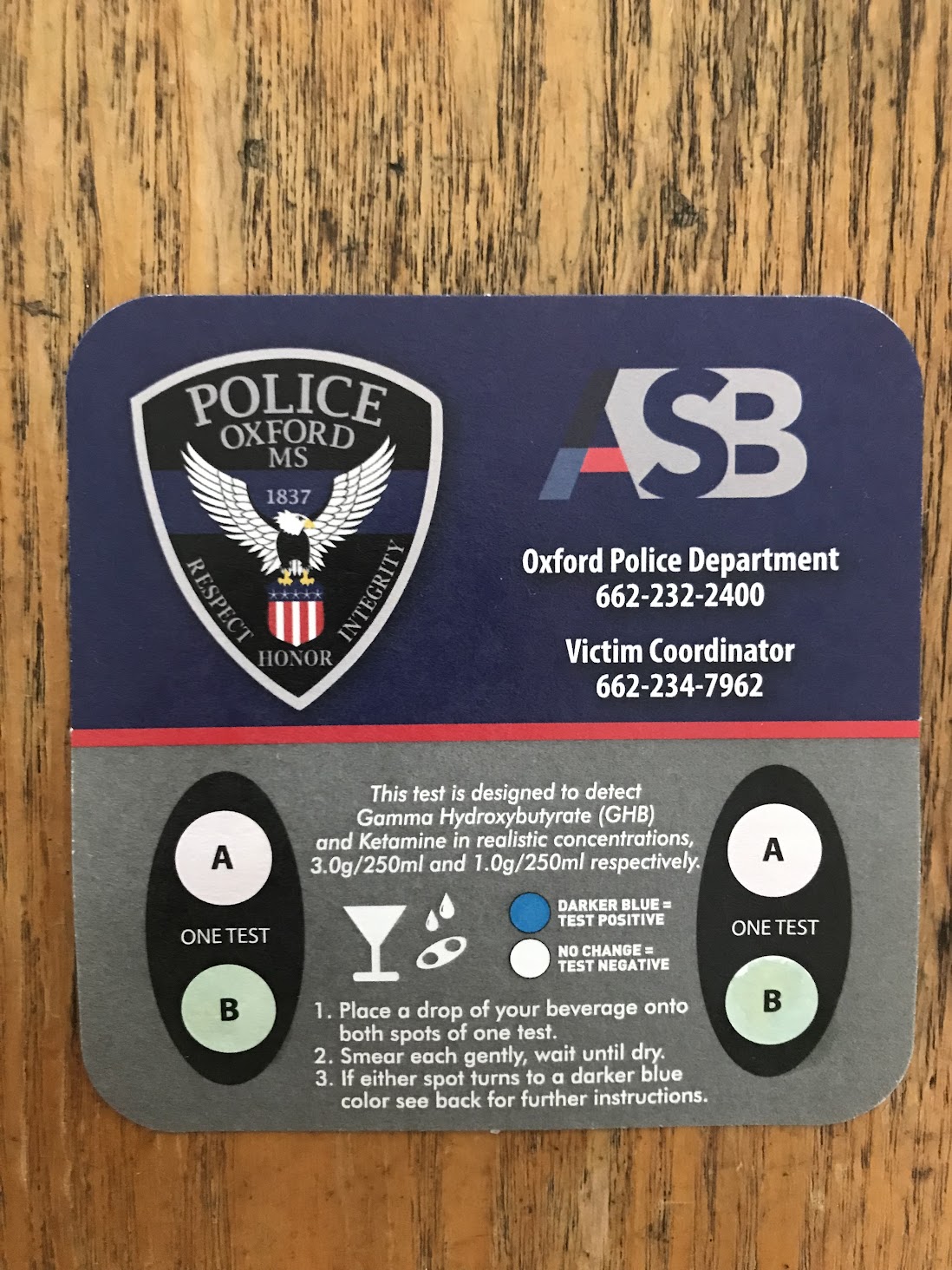In response to increased reports of drugging incidents both on and off-campus, the Associated Student Body and the Oxford Police Department will soon roll out new date rape drug-detecting drink coasters at bars on the Square and at various locations on campus.

The coasters test for Gamma Hydroxybutyrate (GHB) and Ketamine. They do not test for Xanax or Rohypnol, which is commonly known as a “roofie.” OPD found that GHB and Ketamine were the two most common substances used and those tests were available from the supplier at the time.
Users place a drop of their drink onto the designated spots on the coaster. If the drink has been tampered with by one of these drugs, the spot will turn a dark shade of blue. The coasters also include the OPD and the Victim Coordinator’s phone numbers for further help. Each testing coaster lasts five years before it expires.
Oxford Police Chief Jeff McCutchen said this is the first phase of an ongoing collaboration between the university and the police department in response to druggings. The coasters will be introduced the week after spring break.
“When everyone comes back from spring break, our downtown district will have some, and then we’re going to go to the bars and give them away and get their feedback,” McCutchen said. “If (the bars) are like, ‘hey, absolutely I’ll stack these,’ then we’re going to make another big bulk order.”
Mind-altering substances that are put in drinks typically act very quickly, and the substance leaves the person’s system quickly as well.
“The thing that is so important to this (issue) is, we need a good timeline of where you were, quickly,” McCutchen said. “If you went to a party before the bars, if you were out at another restaurant, you have all these investigative leads that the quicker we can get on, the better opportunity we have to identify who may or may not be involved.”
Shelli Poole, the Assistant Director of Violence Intervention & Prevention Services at UM, said there have been a higher number of reports surrounding druggings in the community this year.
“There were large numbers of people who reported being drugged in the fall, and that carried over into the spring,” Poole said.
According to Poole, the VIP office has seen a different pattern in reporting this year. There have still been cases of one person allegedly drugging another person, but there have also been increased instances of “drink dropping,” which means that drugs are put in a few drinks at a time, rendering larger numbers of people incapacitated.
As baseball season continues, Poole warns students to continue to watch their drinks, to try to drink from the original containers and to keep them close.
“(Another) thing that’s super important is for people to stay together,” Poole said. “I’m always pressing that so hard because a lot of the time people (who have been drugged) don’t necessarily look different on the outside, which to me is very alarming.”
Poole said both the VIP and Title IX offices provide students with confidential support as well as academic accommodations.
The university also has a Medical Amnesty Policy, which allows for students to reach out and get help without being punished if they are drinking underage or doing something they think might get them in trouble.
According to drinksafe.com, the most targeted demographic of date rape drugs is women, aged 18-24. Up to 80% of the date rapes occur when a woman is intoxicated.
That being said, anyone can be targeted and must be wary of their drinks.
Morgan Atkins, a senior public policy leadership major and ASB President, said druggings are not a new issue to the Oxford community. Students have even reached out to ASB executives about their personal experiences.
Due to COVID-19, many students are experiencing in-person classes and gatherings for the first time this school year, and ASB has been looking for ways to help prevent druggings and provide education for students on available resources if it does happen to them.
“We talked a lot about ways to put the power in the hands of the students, (so they can) really be in charge of their safety at the bars and be able to have an accountability measure for themselves to make sure everything’s okay,” Atkins said.
Off-campus resources include a Crime Stoppers number that allows for individuals to report any crime they witness. Also the city has a Victim Services Coordinator who works with the police department and the university as confidential resource individuals can reach out to for help.
“We want to find ways to build trust with our community, and especially with our students,” McCutchen said. “We’ve got to find a way to say ‘you’re in a safe place here.’ It doesn’t matter if you’re underage or if there’s other substances you took. It has nothing to do with that. We care about what happened in that moment.”


























